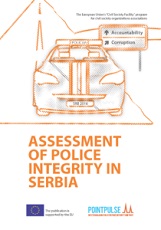2016 ASSESSMENT OF POLICE INTEGRITY IN SERBIA
2016 ASSESSMENT OF POLICE INTEGRITY IN SERBIA
Author(s): Bojan Elek, Saša Đorđević, Sofija Mandić, Vladimir Erceg
Subject(s): Politics / Political Sciences, Politics, Governance, Security and defense, Corruption - Transparency - Anti-Corruption
Published by: BCBP Beogradski centar za bezbednosnu politiku
Keywords: police integrity; Serbia; police sector; corruption
Summary/Abstract: The fourth assessment of the police integrity in Serbia covers the period from December 2015 to December 2016. To ensure the basic role of the police – maintenance and improvement of the safety of citizens – the Belgrade Centre for Security Policy has been regularly examining the integrity of the police since 2012. In addition to the above, the police are legally obliged to fight corruption, among other things, and they cannot successfully perform this task if they do not have the integrity necessary to prevent their own personnel from becoming susceptible to corrupt behaviour. The integrity assessment opens up a discussion of the abuse of police powers, corruption in the police force, and misconduct of police officers. Studies conducted in various democratic countries show that management of the police and police culture are the most important factors that influence the officers’ behaviour. Therefore, the focus of this study is to assess the institutional integrity of the police, i.e. the effectiveness of the reform and managerial moves in the police aimed at making it an accountable and transparent service oriented towards the citizens. We did not analyse whether the reforms at the organisational level have produced effects at the level of individuals, or if they have changed the police culture, as we have not had access to data required for this level of analysis. The research methodology was improved, compared to the last year's study. Two areas – transparency and management – which have been studied in detail in 20151 now represent integral parts of each field of integrity observation. Within them, we analysed the steps forward as well as the problems, in both legal and practical terms. Based on this methodology we have identified five areas of integrity observation: 1) external oversight, 2) police accountability, 3) human resources management, 4) financial management, and 5) criminal accountability. The last area is completely new and it served to assess a formal possibility for criminal prosecution of members of the police force for their corruption activities.
Series: BCBP - Assessment of Police Integrity
- Page Count: 67
- Publication Year: 2016
- Language: English
- Content File-PDF

